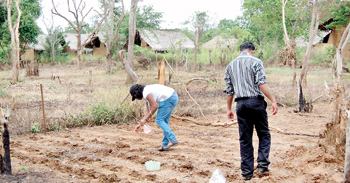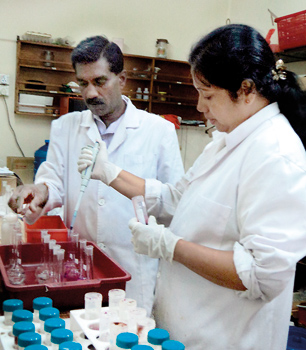News
Down to earth in soil fertility with bio-fertilisers
The harmful impact of misuse and overuse of agrochemicals have been highlighted in articles published in the Sunday Times in the past few weeks. As an alternative, use of bio-fertilisers which is a method of directly applying living microorganisms such as bacteria and fungi to fertilise the soil is becoming popular among farmers, even though these too have to be used with care, point out experts.

Research activites pertaining to vermiwash being carried out at the IFS, Kandy
“Bio-fertilisers are a good nature-friendly way of enriching soil with nutrients by establishing natural nutrient cycles. However, as many foreign bio-fertiliser products are being introduced to farmers, without being tested, there is a risk of introducing harmful organisms too into the country,” warns Prof. Gamini Seneviratne of the Institute of Fundamental Studies (IFS), Kandy. “These harmful micro-organisms can be invasive, spreading fast and causing enough damage,” he added.
Numerous species of soil bacteria which grow on or around roots, stimulate plant growth. Some of these microorganisms such as Rhizobium bacteria fix atmospheric nitrogen into soil and Pseudomonas Bacteria makes Phosphorus soluble, so plants can easily absorb them. Strains of these beneficial soil micro-organisms cultured in laboratories, come into the market as a bottled liquid. These bio-fertilisers can be mixed with compost and used in organic farming or as a supplement for chemical fertilisers. This can reduce the use of chemical fertilizers by at least by 25%.
In Sri Lanka, already there are companies producing bio-fertilisers. However, companies that import bio-fertilisers need to be closely supervised, as they cannot guarantee that imported bio-fertilisers are harmless. Hence, there should be a mechanism to monitor the quality and safety of the imported bio-fertilisers, emphasizes Prof. Seneviratne.

The IFS researcher stresses that the country can benefit from bio-fertilisers, because they are low cost, renewable sources of plant nutrients which can reduce use of chemical fertilisers. Prof. Seneviratne also revealed that an IFS project conducted in collaboration with the Tea Research Institute (TRI) is on the verge of introducing a new, patented formula of bio-fertiliser known as “Biofilmed bio-fertilisers” (BFBF), which has been rigorously tested for more than eight years.
Trials with tea revealed that the new fertiliser can actually reduce use of chemical fertiliser by 50%. It is to be introduced for commercial development by the end of the year. Developing BFBFs for other crops is under way. There are bio-pesticides too, which use similar techniques, but Dr Anura Wijesekara of the Pesticide Registrar’s office confirmed that Sri Lanka does not import bio-pesticides.
‘Vermiwash’ is a solution that contains extracts of earthworm enriched soil. The ‘Green Revolution’ initiated in the 1960s had promoted agrochemicals usage which Sri Lanka embraced. But once convinced of the ill-effects of agrochemicals, agro experts are returning to nature’s way. Earthworms to return fertiliser to the soil
At school we are taught that earthworms are a part of soil biodiversity that help enrich soil fertility. But, to promote the green revolution, we continue to use agrochemicals which kill these friendly creatures. Realising the important services earthworms provide to the soil, agricultural experts have experimented in getting the services rendered by these earthworms, into a specific fertiliser.

“Vermiwash’ is a liquid extract from soil worked on by earthworms. This contains friendly microbes and enzymes that stimulate plant growth,” Dr Gamini Hitinayake of Peradeniya University said.
A microbiological study of vermiwash has revealed that it contains nitrogen-fixing bacteria too. It is therefore an effective way of getting the nutrients back into the soil.
It contains enzymes- secretions of earthworms, which would stimulate the growth and yield of crops, and even develop resistance in crops.
Pointing out that vermiwash was not difficult to make and could be used for home gardens, Dr. Hitinayake gave the following steps:
- Make small holes at the bottom of a barrel or large container mounted on a little platform.
- Introduce soil containing earthworms into the container.
- Introduce drips of water from the top onto the earthworm-rich soil, while collecting the runoff water from the bottom.
- Mix this with water and apply to the crops.

